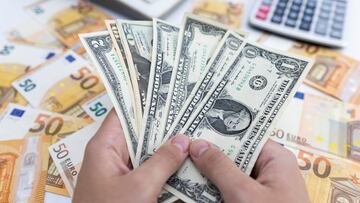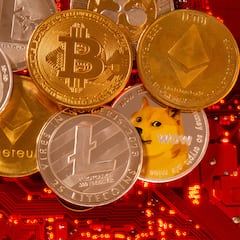Why is the euro falling? Is it a good time to buy?
The price of the euro in comparison to the dollar slipped to a 20-year low this week, but will the continental currency bounce back in the coming months?


The euro has fallen to 20-year low in comparison to the US dollar this week as European nations suffer major economic set-backs.
On Wednesday afternoon the euro was trading as low as $1.0165 in Europe, a clear sign that the currency’s prospects were looking bleak. The price rose slightly, just above the $1.02 mark, on Thursday but the continental currency remains extremely weak.
Experts have warned of the threat of a recession in Europe, even at a time when record-high inflation is causing problems for consumers. So why has the slump occurred, and is now a good time to buy euros?
OUCH! #Euro sank to a 20y low against the US Dollar as investors pared bets on #ECB interest-rate hikes given the growing risk of a recession in the region. Euro fell as much as 0.9% to 1.0331, its weakest level since December 2002. pic.twitter.com/vssaqsxu8m
— Holger Zschaepitz (@Schuldensuehner) July 5, 2022
Euro weakens with continued Russian sanctions
The euro zone’s common currency has been on the decline for months, stemming back to the introduction of major economic sanctions against Russia. In the aftermath of the invasion of Ukraine many nations, including the US, imposed sanctions on Russian-produced fuels, a key component of the Russian economy.
However in Europe this posed a serious problem as major economic powers such as Germany were extremely reliant on Russia for the gas and oil needs. Far from exerting pressure on Moscow, the Kremlin is now threatening to further reduce the availability of gas to countries imposing sanctions.
The U.S. dollar has been surging so much that it's nearly equal in value to the euro for the first time in 20 years.
— The Associated Press (@AP) July 7, 2022
That trend threatens to hurt American companies because their goods become more expensive for foreign buyers. https://t.co/CVc55lKSRN
Fossil fuels remain a major factor in economic production and financial institutions are warning of dire impacts. Earlier this week Deutsche Bank said that the current German natural gas shortage will likely have consequences on the wider energy market in Europe.
Deutsche Global’s Head of FX Research George Saravelos said: “If both Europe and the U.S. find themselves slip-sliding in to a (deeper) recession in Q3 while the Fed is still hiking rates, [all-time extremes] could well be reached.”
Is now a good time to buy euros?
For anyone planning a summer trip to Europe, the decline of the euro in comparison to the dollar will mean a favourable exchange rate when it comes to purchasing abroad. One year ago the euro was trading for a little under $1.20, meaning that travellers will get considerably more bang for their buck this summer.
For some who are planning to travel in the more distant future, the question becomes whether or not the price of the euro will continue to fall. Despite the threat of further economic pain in Europe, some experts are suggesting that it will regain some of its USD value in the coming weeks.
Related stories
Last month the US Federal Reserve announced that it was implemented a huge interest rates increase in a bid to cool the overheating economy and lower inflation. This technique should ease the price rises but will have knock-on effects for the rest of the economy.
It will likely lower US GDP and devalue the dollar globally in the process. It is yet to be seen in what timeframe this will actually occur, but President Biden has citing bringing down inflation as one of his top domestic priorities.

